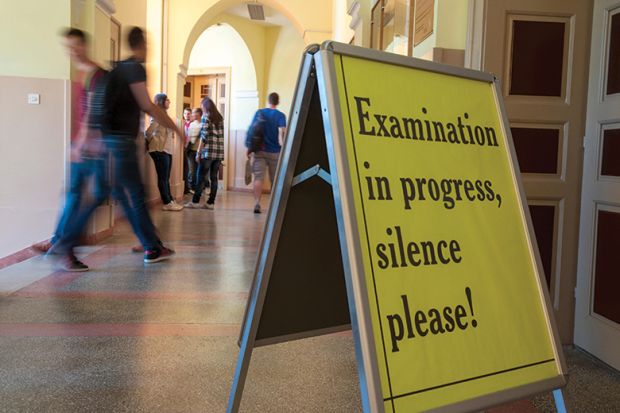As teaching in higher education involves almost constant innovation, assessment of that learning can sometimes get relegated to something of an afterthought. Plenty of literature examining the pros and cons of different techniques exists, yet the vision of students scribbling away at a desk for hours at the end of term has endured in higher education for hundreds of years.
“People constantly talk about teaching and learning, but assessment and feedback can often feel like it’s tacked on at the end,” said Cath Ellis, an associate dean (education) at UNSW Sydney. “We often talk about curriculum design but less so about assessment design. The persistence of the invigilated three-hour exam is remarkable − and a weakness.”
Jesse Stommel, executive director of online journal Hybrid Pedagogy, explained that bureaucracy is part of the problem.
“It’s clear that accreditors, administrators, faculty, students and graduate admissions boards aren’t talking with one another enough − or sometimes at all − so it has become nearly impossible to make changes in one part of the system without running aground on a series of bureaucratic hurdles in some other part of the system,” he said. “And almost no one, especially students, feels empowered to ask hard questions about the what, why and how of assessment.”
Dr Stommel added that all those involved across the university need to have wide-ranging conversations about assessment, starting with the basic question: who is assessment for?
“We need to start these conversations from the presumption that students are humans first, not rows in a spreadsheet,” he said. “We need to trust students to be partners in shaping the future of their own education. This means we can’t begin with the belief that our job is to rank students against one another or to police student learning, and certainly any efforts toward reform will be frustrated if we don’t let go of broad assumptions that students lack integrity.”
Kelvin Tapley, a senior lecturer in colour science at the University of Leeds and fellow of the Leeds Institute for Teaching Excellence, agreed: “It’s a partnership between staff and students. In the past it has been protected by academics, but transparency is important. We need to recognise that what happens after their studies is varied, so you need to talk to them about where they might be going, what they need for their careers.”
Dr Tapley pointed to the work done by UK sector agency Advance HE on transforming assessment as a useful tool. Leeds drew on this to create the Leeds expectations for assessment and feedback, which set out the attributes that assessment at Leeds has to have, such as inclusivity and reliability.
“It’s important to be more transparent about how we’re assessing and why, what are the criteria and give [students] the opportunity to do some work in that,” he said. He added that it is important for assessment to be part of the learning process; universities should move away from just focusing on assessment as “of” the learning to give more focus to assessment “for” learning, he added.
Dr Ellis agreed. “The question people have to ask is: what are we testing?” she said. She suggested “authentic assessment” as a useful tool, which focuses on “real-world” scenarios, often testing skills such as critical thinking or problem-solving, rather than whether students have memorised certain bits of knowledge.
One way of approaching it is to start with assessment when designing courses, rather than tacking it on at the end, which plays into the idea that assessment can be part of the learning process. “I love marking, which many don’t, but it’s where you see the learning happen. I think when people get excited about marking assessment, you’re on to something good,” Dr Ellis said.
If academics want to improve their ability to assess, the first thing people can do is read the literature. “You don’t need to reinvent the wheel. People, particularly in Australia and the UK, have done great research into this already,” she said, adding that the coronavirus pandemic and subsequent switch to online had highlighted how “not fit for purpose” many of the current methods are.
Stephen Dobson, dean of education at Victoria University of Wellington, agreed that the rush online had accelerated the need to look at assessment. “This is not only a question of needing extra resources − it is about winning the hearts and minds of academics, students and supporting staff,” he said. “Assessing online requires recalibrating…how you assess and organise the assessment, such as [using] different or varied forms of online assessment [such as] more online orals or group presentations to address integrity issues and cheating.”
Dr Tapley added that “a lot of what these adjustments will do will help inclusivity”. By moving away from the “rigid exam types of assessment, through making them more authentic or using student-led assessment, it will help a wider mix of students”, he said.
POSTSCRIPT:
Print headline: Make sure assessment is not an afterthought
Register to continue
Why register?
- Registration is free and only takes a moment
- Once registered, you can read 3 articles a month
- Sign up for our newsletter
Subscribe
Or subscribe for unlimited access to:
- Unlimited access to news, views, insights & reviews
- Digital editions
- Digital access to THE’s university and college rankings analysis
Already registered or a current subscriber? Login








